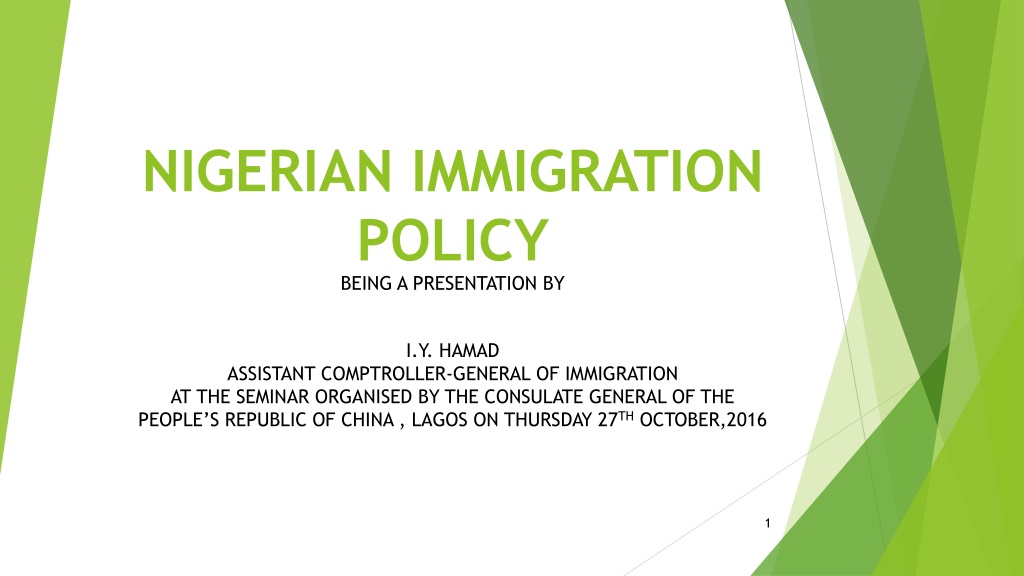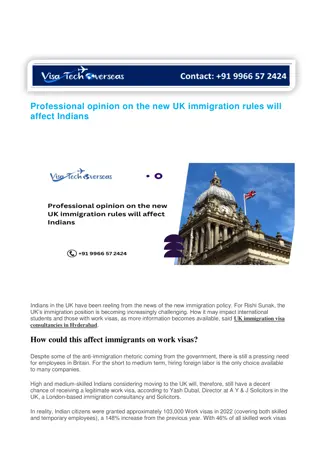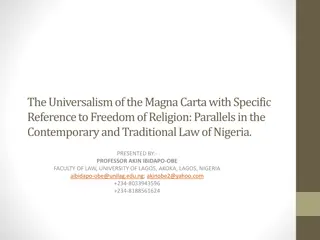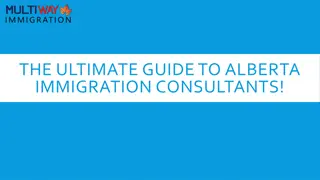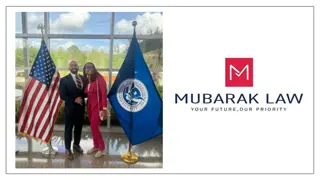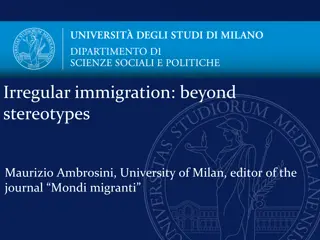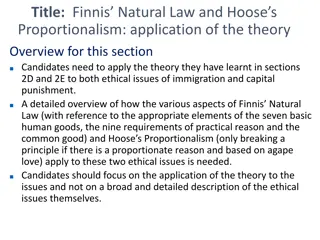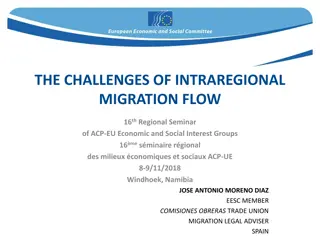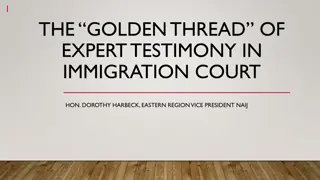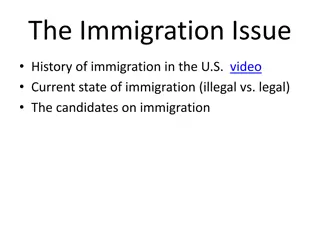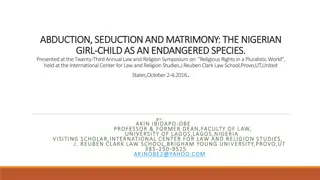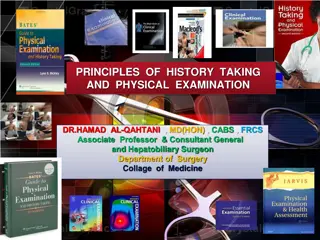Nigerian Immigration Policy Presentation by I.Y. Hamad at a Seminar Organized by the Consulate General of China
This presentation by Assistant Comptroller-General I.Y. Hamad at a seminar in Lagos delves into the conceptual definitions of immigration, the connection between migration and economic development, the legal instruments of the Nigerian Immigration Service (NIS), functions of NIS, procedures for issuance of CERPAC, e-PASS registration guidelines, and reforms in reentry visas. It highlights the importance of compliance with the Nigeria Immigration Act for expatriates, companies, and organizations.
Download Presentation

Please find below an Image/Link to download the presentation.
The content on the website is provided AS IS for your information and personal use only. It may not be sold, licensed, or shared on other websites without obtaining consent from the author. Download presentation by click this link. If you encounter any issues during the download, it is possible that the publisher has removed the file from their server.
E N D
Presentation Transcript
NIGERIAN IMMIGRATION POLICY BEING A PRESENTATION BY I.Y. HAMAD ASSISTANT COMPTROLLER-GENERAL OF IMMIGRATION AT THE SEMINAR ORGANISED BY THE CONSULATE GENERAL OF THE PEOPLE S REPUBLIC OF CHINA , LAGOS ON THURSDAY 27THOCTOBER,2016 1
INTRODUCTION In this paper attempt will be made to discuss the conceptual definitions of immigration, the nexus between migration and economic development, with a general overview of the Legal instruments of NIS, the functions and duties of the NIS, highlight the procedures and requirement for the issuance of CERPAC , the e-PASS Registration guidelines and the new reforms of abolition of reentry visas, implementation strategies and guidelines. Thereafter, conclusion will be drawn and recommendations made on the need for strict compliance with the relevant provisions of the Nigeria Immigration Act, 2015 by expatriates, companies and organization. 2
DEFINITION OF IMMIGRATION The word Immigration is the noun form of Migrate . According to The Chambers Dictionary 11th Edition (2009), migration is a change of abode, a removal from one country or climate to another, especially in a large number. But, Black s Law Dictionary (2009) defines Immigration as the act of entering a country with the intention of settling there permanently . Generally, migration is the relocation of a person from his place of primary abode to another in search of a better living, for studies, to reunite with families and for investment. Migration may be internal and external. Thus, an immigrant is a person who immigrates or has migrated. 3
THE NEXUS BETWEEN THE NATIONAL ECONOMY, MIGRATION AND MIGRATION MANAGEMENT. The fact of the nexus between human migration, migration management and economic development has evidenced the pivotal role of the NIS as a security service and a social development agency. And in a bid to underscore the dynamics of the nexus between migration and development, the 65th session of the United Nations General Assembly in 2010 exhaustively discussed the issue of Migration and Development, Migrant workers and their perception, conditions of work, how economies absorbed them without necessarily welcoming them. Nigeria economy is facing challenging circumstances, due to dwindling oil receipts just as are many commodity driven emerging economies ; Nigeria must welcome the talents and investments of those from around the globe who still look to Nigeria as the Land of Opportunity. The key is the ease with which potential foreign investors can come into the country and do business with predictable legal and administrative(including immigration) regimes. It is therefore gratifying to note that the NIS has introduced new immigration policies that will enable Nigeria be a strong player in global economy; such as new visa policy, reforms and abolition of reentry visa to legally resident expatriates in Nigeria to ease the cost of doing business in Nigeria and in accordance with best practices. 4
LEGAL INSTRUMENTS OF NIGERIA IMMIGRATION SERVICE The Immigration Act, 2015. The Immigration Regulations, 1963 (as incorporated into Immigration Regulations, Cap 11 LFN, 2004). The immigration (Control of Aliens) Regulation, 1963 (as incorporated into Immigration (Control of Aliens) Act, Cap 11 LFN, 2004. The Constitution of the Federal Republic of Nigeria, 1999. The ECOWAS protocols on free movement of persons, Residence and establishment, 1979. The company and allied matters Act, 1990. 5
Trafficking in Persons (Prohibition) Law Enforcement and Administration Cap T. LFN 2004. Passport (Miscellaneous Act), Cap 11 LFN, 2004. Diplomatic Immunity and Privileges Act, 1962 International Civil Aviation Organization (ICAO) Conventions. Oil and Gas Free Zone Authority (OGFZA) Act, Cap O. LFN,2004. National Refugee Law of 1989. African Charter on Human and Peoples Rights(Ratification and Enforcement) Act, CAP 11, LFN 2004. 6
THE FUNCTIONS AND DUTIES OF NIGERIA IMMIGRATION SERVICE The control of entry and exit of all persons entering and leaving Nigeria in all the recognized gateways. The control and administration of foreigners economic activities with a view to enhancing Nigeria s economic productivity and growth. Charged with the administration, issuance and control of travel document (including Standard, Official and Diplomatic passports to Nigerians). Advisory role to government on citizenship, and other migration related matters as member of the Advisory Committee on Nigerian Citizenship. Administration and implementation of Nigeria expatriate quota regime. 7
Visa administration, aliens control and issuance of Combined Expatriate Residence Permit and Aliens cards (CERPAC). Coordination of land, marine and general surveillance of Nigeria territorial frontiers. Inspection of companies to ensure compliance with approved quota utilization and the mandatory Nigerian understudy conditions. Investigation, apprehension, detention and Enforcement of repatriation and deportation orders. Determination of refugees and asylum seekers in Nigeria. 8
the administration of ECOWAS protocol on free movement, right of residence and establishment by ECOWAS nationals. Internal security especially with respect to the activities of foreigners Nigeria. Implementation of the provision of the Passport (Miscellaneous Provisions)Act. Enforcement of Laws relating to Foreign Investment in Nigeria. Implementation of bilateral and multilateral Treaties between Nigeria and other countries. 9
REGISTERING A BUSINESS AS A FOREIGNER IN NIGERIA: REGULATORY ISSUES BUSINESS PERMIT: is an operational and permanent permit issued by the Federal Ministry of interior for the local operation of a business with expatriate investment either as a branch or subsidiary of a foreign company . EXPATRIATE QUOTA: is: the permission given to a business to employ foreigners. The number of the quota depends on the share capital of the company and a minimum share capital of Ten Million Naira is necessary for a company to qualify for expatriate quota. COMBINED EXPATRIATE RESIDENCE PERMIT AND ALIENS CARD (CERPAC) : permits an expatriate to live and work in Nigeria on a long-term basis. For an expatriate to obtain Resident permit, he must obtain employment with a company that has expatriate quota position. The expatriate is required to arrive in the country with a special type of entry visa known as STR (Subject To Regularization) visa after which his resident permit will be processed. 10
REGISTRATION OF SECURITIES:: a foreigner who owns shares in any Nigerian company must apply to the Security and Exchange Commission (SEC) for the registration of those shares. This is because the Investment and Securities 1999 provides that the SEC must keep a register of foreign direct investment and foreign portfolio investments. Registration with the Department of Petroleum Resources may be necessary where you seek to provide services, equipment supplies and maintenance services to companies in the oil industry. Registration with National Office of Technology Acquisition and Promotion (NOTAP): Every contract or agreement involving the transfer of foreign technology to a Nigerian company must be registered with the NOTAP within sixty (60) days of execution or conclusion of the agreement. 11
REQUIREMENTS FOR GRANT OF BUSINESS PERMIT For only Joint Venture and wholly Foreign owned Companies. Completed Immigration Form T/1 Certificate of Incorporation Memorandum and Article of Association Feasibility Report (should be certified or registered with Corporate Affairs commission (CAC) Corporate Affairs Commission s Form CAC C02 & C07 Joint Venture Agreement for partnership venture between Nigerian and foreigners (original to be presented for sighting) Company s Current Tax Clearance Certificate (Original to be presented for sighting) Lease agreement or C of O for operating premises (original to be presented for sighting) 12
REQUIREMENT FOR THE GRANT OF EXPATRIATE QUOTA ONLY Same documents as in (a) above plus: Evidence of imported machinery, such as, Form M, Proforma invoice, Shipping documents and Clean Certificate of Inspection issued by Government appointed Pre-shipment Inspection Agents. License / Permit / Certificate from relevant Government Agencies / department / ministries for the operation or execution of project if company is engaged in oil services, health care services, fishing, mining, constructions (Work Registration Board), etc (original to be presented for sighting) Evidence of work at hand, its duration and value attached to the contract(s) if the company is engaged in building, civil engineering, construction, etc (original to be presented for sighting) Proposed annual salaries to be paid to the expatriates to be recruited indicating designation, names, jobs description and qualifications (CV and copies of credentials of expatriate to be attached). 13
RENEWAL OF EXPATRIATES QUOTA Completed Immigration Form /T2 Corporate Tax Clearance Certificate (original to be presented for sighting) Current Tax Clearance certificate of the expatriate (original to be presented for sighting) Expatriate Quota Returns for the three months preceding the date of approval. Detailed Training programme for Nigerians List of Nigerians understudying expatriate on prescribed formats showing date employed, qualification, etc. List of Nigerian Senior/Management Staffs showing names, designations, qualifications, salaries per annum Certificate Current Audited Accounts Annual income tax Clearance certificate of the Expatriate staff (original to be presented for sighting); 14
ADDITIONAL EXPATRIATE QUOTA Same documents as for renewal of expatriate quota plus: Evidence of acquired machinery or expansion of company is engaged in manufacturing in the form of Clean Certificate of inspection (CCI) issued by Government appointed Pre shipment inspection Agents Evidence of new contract if Company is engaged in construction/engineering and oil (original to be presented for Sighting) see b (ii) for guidance Evidence of acquired farm / factory if Company is engaged in agro-allied business (original to be presented for sighting 15
PERMANENT UNTIL REVIEWED QUOTA (P.U.R) Minimum share capital should be N10 Million Appreciable net profit of which not less than N2 million has been paid as Corporate Tax (original to be presented for sighting) Certified and Detailed Audited Account Certificate of Incorporation Monthly Returns of Expatriate Quota Company Organization Structure Individual Income tax Clearance Certificate of the expatriates (original to be presented for sighting). policy direction of Government. company s area of business to fall within priority sectors of the economy. Evidence that P/U.R would guarantee Technology transfer. Company should have large quota portfolio and Corresponding share holding as an added qualification. 16
COMBINED EXPATRIATE RESIDENCE PERMIT AND ALIENS CARD (CERPAC): GUIDELINES The envelope containing this CERPAC Pack should be preserved and used in submitting your forms and documents after completion. All fees paid to obtain forms are not refundable. In the event of loss of form(s), replacement will be treated as a new issue and will attract the original fees. Any erasures, cancellation, or defacement of any sort shall render the form(s) void. Any form(s) voided must be returned as a complete set to the bank of purchase for replacement. Such replacement will attract a service charge and pack cost payable to the Bank. Three (3) Nos. 2 x 2 passport photographs on white background should be submitted with the completed forms. One of the photographs should be attached to the bottom right-hand side of the CERPAC form titled Receipt and Temporary Card You are required to append your signature beside your photograph attached on the form . Enclose also one (1) No. facial portrait measuring 4' x 3' (inch) white background 17
Requirements :REGULARISATION OF STAY Application letter from the employer requesting Regularization of stay and accepting Immigration Responsibility (IR) on behalf of the expatriate. Letter of Appointment/Employment Acceptance of offer of Appointment/Employment. Form IMM22 with three (3) Passport size photograph. Quota Approval Vetted Credentials Valid Passport with STR (Subject to Regularization) (Employment) visa and photocopies of relevant pages. 18
THE NEW VISA POLICY AND REFORMS The new Visa regime approved by the Federal executive Council on 6th June, 2012 is a plethora of visa regimes aimed at increasing the in flow of foreign direct Investment (FDI) ; encouraging rapid industrialization; employment generation; boosting tourism and attracting innovators and Highly skilled professionals. A special class of visa now exists for issuance to investors who imports and invest a minimum level of capital into Nigeria in a verifiable new business for a minimum period of five (5) years; this is a slight innovation to the Permanent Until Review (PUR) Quota holders. In the new system, an investor, who imports a certain threshold of capital, will be entitled to receive a permanent residency status as part of an automatic expatriate quota allocation. 19
Visa on Arrival Visa on Arrival facility at the ports of entry is available to frequently travelled high net worth investors, Directors of multinationals and other persons in that category. This is an operational innovation aimed at attracting high volume of investment into Nigeria with the attendant benefits. Issuance of Temporary Work Permit (TWP) is still being professionally administered. The establishment of the NIS Desk at the One Stop Shop of the NIPC: the presence of our officers at the Nigerian Investment Promotion Commission to give investors relevant information on immigration matters and provide relevant services is in line with global best practice. 20
There is a wide range of incentives for investors operating in the Free Trade Zones. Free Trade Zones in Nigeria are regarded as autonomous locations with flexible and minimized business regulations, in addition to other incentives to encourage participation. In line with the Federal Government Policy to attract and sustain foreign Direct Investment, foreigners who work at the Free Trade Zones enjoy quite a number of incentives which include: expatriate quota waiver, Reclassification of Visas, flat rate of reentry visas and other relaxed regulations. Through these incentives, the NIS has provided a conducive atmosphere for many companies to operate in the Free Trade Zone with the multiplier effect of value added to our national economy. 21
e-PASS REGISTRATION GUIDELINES AGGREGATE/TOTAL DURATION OF STAY PER ANNUM: Up to 56 days Nil fee 56 90 days $200 91 180 days $1000 181- 365 days $2000 22
CONCLUSION Section 14 of the Immigration Act,2015 empowers the NIS to control persons arriving or departing Nigeria and persons who are at any time therein Essentially, by virtue of the provisions of Section 1 of the Act, the NIS has become a corporate entity. The Immigration Act,2015 is a full and comprehensive legal document on regular and irregular immigration as it captures all the immigration issues and modern trends in migration and migration management with additional offences and penalties. However, the cumulative effect of the penalty provisions of the new Immigration Act is it inhibits sharp practices that could infringe the Act and enhance compliance with the Nigeria Immigration Laws. Therefore, companies and other organization are hereby enjoined to cooperate with the NIS for the successful implementation of the new visa policy and ensure full compliance with the relevant provisions of the Act , 23
